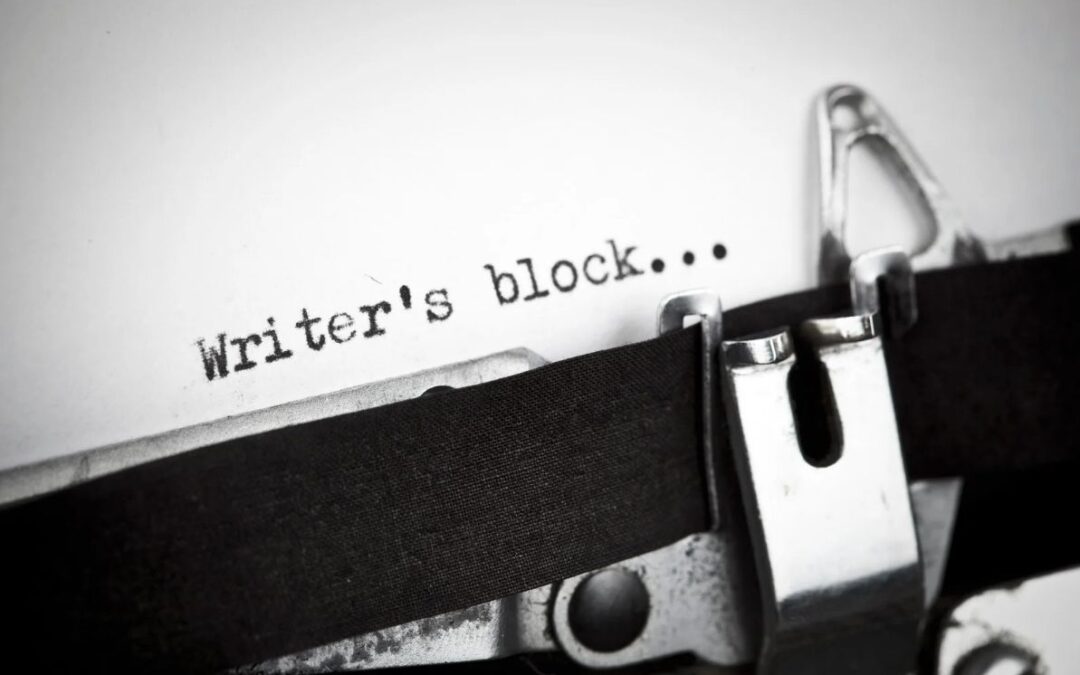Hey there, fellow writers!
I may as well have begun with “Hey there, everyone,” because from what I can tell, everyone writes something at one point or another.
Not you, you say? You’re not a writer? Well, what about emails? Birthday cards? Grocery lists? Love letters? (When was the last time you wrote a love letter? Surely you love someone…give it a go!) So even if your job description doesn’t include writing, per se, you’re still a fellow writer, and this article is for you.

Writing can be tough, right? Ever find yourself staring at a blank page, waiting for that lightning bolt of inspiration to strike? Ah, yes. The dreaded writer’s block! Take it from me, a professional writer who spends much of her day banging away on her keyboard: I’ve been there, done that. But don’t worry, because I know of a few things that can unjam even the jamiest, blockiest block, so let’s dive into some tried-and-true strategies that’ll have you churning out ideas as fast as…I dunno, umm…as fast as bees make honey! (Whew. That was writer’s block in action back there. Took a while to find an appropriate simile…)
Ready? Let’s go!
1. Create a writing routine
Those of you who’ve read me for a while already know the first thing I always say: Set up your environment for success! With writing, consistency is key when it comes to fostering creativity. Establish a writing routine that fits your lifestyle, whether it’s early mornings, late nights, or any time that feels right. Find a cozy writing space that inspires you, and surround yourself with tools that make writing enjoyable. When you stick to a routine, your mind becomes conditioned to be creative during those specific times—and research verifies this. It’s like training your brain to switch into writing mode. Over time, this routine will become a cherished ritual, making it easier to dive into the depths of your imagination and generate ideas.

2. Practice freewriting
Feeling stuck? Try freewriting. It’s a powerful technique to overcome writer’s block and unlock your creativity. Set a timer, and write continuously without worrying about grammar, structure, or coherence. Just let your thoughts flow onto the page. This practice helps bypass your inner critic and taps into the more relaxed, less rigid areas of your brain—places where great thoughts may be hiding. With regular freewriting, you’ll notice a shift in your mindset, making it easier to generate ideas. Even when you’re not stuck, you can use freewriting as a warm-up exercise before your main writing sessions. It’s a playground for your imagination where you can experiment and explore without judgment.
3. Do some brainstorming
When you’re out of ideas, brainstorming techniques can help kickstart your creativity. Mind maps, word associations, and plain old lists are great ways to visualize connections and explore different facets of a subject. Start with a central theme and branch out with related ideas. Let your thoughts flow freely and you may find some unexpected connections. Experiment with different techniques to find what works best for you. Each method encourages divergent thinking, helping you break free from mental blocks.
Personal aside: I’m a huge fan of mind mapping. Yes, there are mind mapping software programs that can assist you, but before you run out and purchase one, here’s a link to a brief article that explains simple mind mapping techniques, complete with examples: https://simplemind.eu/how-to-mind-map/basics/
4. Channel your inner detective
Grab your secret decoder ring and your magnifying glass! Cultivate a curious mindset. It’s what drives us to ask questions, explore new territories, and seek knowledge. Start by questioning everything around you. Be curious about topics that interest you and those that challenge your understanding. Dive into new experiences, explore different cultures, and engage with art in all its forms. Attend lectures, visit museums, and have conversations with people from diverse backgrounds. Each encounter enriches your creative wellspring, making it easier to draw connections and generate fresh ideas. Keep your sense of wonder, openness, and receptivity alive and never stop asking “how,” “why,” and “what if.”

5. Seek inspiration everywhere
Sometimes, stepping outside your usual routine can reignite your creativity. Engage in activities that spark your imagination. Music, for instance, can evoke emotions and trigger creative thoughts. Listen to different genres and artists, and let the melodies transport you to new mental landscapes. Art is another fantastic source of inspiration. Visit galleries, explore online exhibitions, or try creating some art yourself! Nature, too, offers boundless inspiration. Take walks, observe the beauty around you, and let the sights and sounds rejuvenate your mind.
6. Take breaks and recharge
Even the most creative minds need rest. Pushing too hard can lead to burnout, so be sure to incorporate breaks into your routine to recharge. Engage in activities that bring you joy and relaxation. Take walks, get some exercise, practice mindfulness, listen to music, or pursue hobbies unrelated to writing. These moments of respite allow your mind to rest and replenish its creative reserves. Often, the best ideas come when you least expect them.
Personal aside: Here’s a weird thing that works for me. When I’m feeling stuck, I stop writing and…I write something else! Yes, I can sometimes unstick myself by continuing to write, but in a different style or format. For example, if I’m writing an article and I become stuck, I stop and answer a few emails. Or if I’m not sure how to answer an email, I switch over to journaling for a while. Using this technique, I don’t pull my focus from “the writing zone” altogether; I simply apply it to a different writing task.
7. Tap into writing communities
No need to go it alone! Connect with other writers and join supportive communities. Writing groups, workshops, and online forums provide inspiration, feedback, and collaboration opportunities. Sharing your work with trusted peers allows for constructive feedback and valuable insights, while witnessing the journeys of others can motivate you to explore new avenues of creativity. A supportive community offers encouragement, accountability, and a wealth of ideas—what’s not to like? But what if you’re feeling shy? Or thinking you’re not worthy because you’re not a “real writer?” Well, think again, and check out this excellent article, complete with links to online writing communities. Whether you write emails, reports, proposals, novels, or letters to your grandkid, there’s definitely a community for you: https://www.clevergirlauthor.com/online-writing-groups/
8. WARNING…least favorite tip approaching: Learn to type!
Sorry, but I would be remiss if I didn’t mention it, and please don’t groan. It’s also probably why most articles on overcoming writer’s block don’t share this important tip. Yes, it might be a hassle, especially if you never took a formal typing class in school (b-o-r-i-n-g…), but if you want to be an efficient writer, learn your way around the keyboard. Trust me. Having command of a keyboard will set you free, and you’ll be able to capture your thoughts almost as quickly as you can think them. Don’t get me wrong…taking pen and paper off to the park to write a love sonnet is super fun (and super romantic!), but when it comes down to producing quality writing, there’s nothing as satisfying as the gentle tap-tap-tapping of your keyboard, fingers flying, thoughts materializing like magic…this is writer’s nirvana.

9. Read, read, read!
It might seem counterintuitive, but if you want to become a better writer, you’ll want to become a more committed reader. Reading is like fuel for your writing engine. The more you read, the more your creativity will ignite. Dive into a variety of genres, authors, and topics to soak up different styles and perspectives. Whether it’s classic literature, modern fiction, non-fiction, or even poetry, each reading experience broadens your horizons and sparks new ideas. Think of it as expanding your writer’s toolkit. When you encounter diverse literary techniques, they seep into your brain, subtly influencing your own writing style. Plus, reading enhances your understanding of the world, introduces you to different cultures, builds your vocabulary, and fosters empathy—key ingredients for any creative process. So, whether it’s an actual, physical book (remember those?), an e-book, or an audiobook, make reading a daily habit.
And the most important tip of all…
10. Have fun with it! Finis.
And there you have it, folks! Ten tips to keep those creative thoughts flowing. Remember, creativity isn’t a switch you can flip on and off. It’s more like journey of self-discovery and growth. Trust the process, stay curious, and most importantly, enjoy yourself. Happy writing, and may your ideas be ever plentiful!


